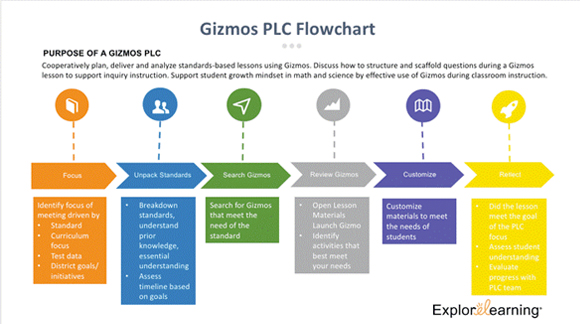
An ExploreLearning Article
A professional learning community, also known as a PLC, is a group of educators that meet regularly and share expertise; working collaboratively to improve teaching, learning, and the academic performances of their students.
According to Richard DuFour, in his book Whatever It Takes: How a Professional Learning Community Responds When Kids Don’t Learn, there are three big ideas that are core principles of a PLC.
- Ensure that students are learning: It is important to determine the objectives, what it is that you want students to know, and what objectives you want them to meet.
- Provide a cultural collaboration: Create a collaborative lesson plan and focus on what students need to learn and how the learning will be measured.
- Focus on results: PLC members return and debrief about the lessons. They then analyze the students’ work and their data.
How can Gizmos be used to facilitate a professional learning community for math and science?
ExploreLearning Gizmos are highly interactive online simulations for both math and science that cover content in grades three through twelve. Gizmos help students gain a deeper understanding of the math and science concepts that they are learning. Incrementally based, these powerful interactive visualizations of concepts help teachers support and enhance their instruction. And students get an opportunity to manipulate key variables, generate and test hypothesis, and simply engage in extensive what-if experimentation.
Gizmos include resources that support identifying the objectives, cultural collaboration, and lesson exploration. They also include assessment materials that can be used to debrief.
Gizmos PLC Toolkit
The Gizmo PLC Toolkit provides documents that can help a PLC group collaboratively plan, deliver, and analyze standard-based lessons using Gizmos. It also provides a framework for discussions on how to structure and scaffold questions during a Gizmos lesson to support the agreed instruction. And finally, the PLC Toolkit will support student growth mindset in both math and science by analyzing teacher responses to students during an inquiry-based lesson.

Focus
First, a PLC group must determine their focus. It could be standard-based, curriculum-focused, test-driven, or could be around a district goal or initiative.
If the focus is standard-based, the next step in the PLC Toolkit process is to unpack the standard. The members meet to break down the standards as a group, exploring what prior knowledge will be necessary, and what some of the essential questions to ask students will be.
Gizmos are searchable by standard so teachers can choose their state, grade and subject find Gizmos that support those standards.
For instance, the Gizmo Mean, Median and Mode can be found through a state standards search on www.explorelearning.com. For example, the Florida State sixth grade math standard MAFS.6.SP.2.5.c lines up perfectly with the with the Mean, Median and Mode Gizmo. The standard: Giving quantitative measures of center (median and/or mean) and variability (interquartile range and/or mean absolute deviation), as well as describing any overall pattern and any striking deviations from the overall pattern with reference to the context in which the data were gathered.
Timeline
As a group, the PLC needs to determine a timeline to achieve the different goals and objectives. What prior knowledge will be needed? What type of data would the group like to receive?
Objective
At this time in the process, the group should review the Gizmos and identify what activities would help support the PLC initiative.
The exploration sheet that comes with each Gizmo provides students and teachers with the opportunity to visit prior knowledge questions, as well as engage in a warm-up activity. There are lessons associated with the Gizmos, and an answer key for teachers to use to verify students’ work. The teacher guide provides a valuable opportunity to take a look at objectives, and also gives teachers a nice script to follow for the lesson as well as a solid overview of what’s included in the Gizmo.
Educators can edit and customize Gizmo resources to help meet PLC objectives. For instance, in the prior knowledge section, a teacher can pick out the questions that they feel are most appropriate for the goals of the PLC group. In each activity the group can determine what components of the student exploration sheet they’d like to keep, and what components need to be altered slightly to better fit the goals and objectives of the PLC and state standards.
At the end of every Gizmo is an opportunity to discover what students have learned with assessment questions. This gives teachers immediate feedback and data to use with their PLC group to determine if students were successful with interacting with a particular standard and demonstrating what they’ve learned.
Reflect
The PLC group should meet afterwards to reflect on whether the lesson met the goals of the PLC. Did students have opportunities to demonstrate their understanding of the objectives? How can the PLC group evaluate their process and determine whether they were successful?
The PLC process really provides teachers with a platform to engage in discourse centered completely on student learning and outcome. Using Gizmos and the PLC Toolkit, educators can provide their students with a highly engaging opportunity to learn and to master the concepts that they’re teaching.
To learn more about Gizmos, try out Gizmos for yourself with a free account.